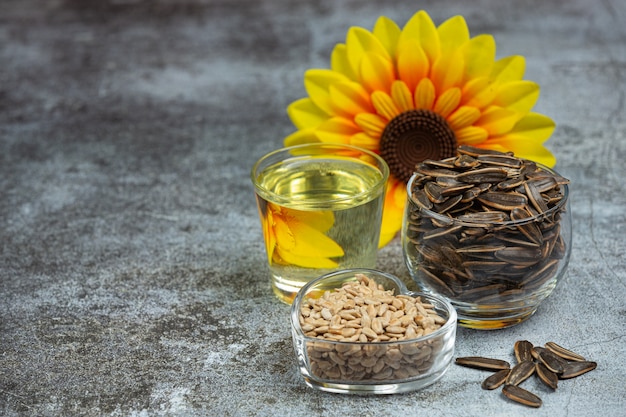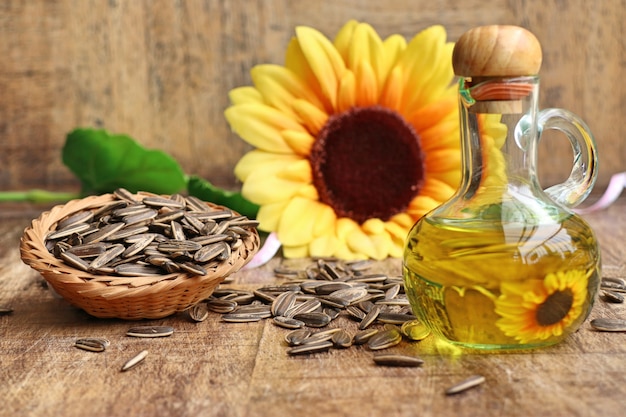Properties of sunflower seeds
Daily consumption of sunflower seeds (Helianthus annuus) can provide our body with a significant amount of necessary minerals, vitamins, proteins and antioxidants. Sunflower seeds are an accessible and economical food that is very nutritious and can play an effective role in the treatment of various infections, inflammations, malignancies and cardiovascular diseases. Due to the important role of sunflower seeds in our lives, in this article we will examine some of the most important benefits and properties of sunflower seeds as well as the disadvantages of sunflower seeds. Key points about when and how to water African violets
About sunflower seeds and sunflower oil
Usually, sunflower seeds are used to make sunflower oil, which is a very useful food supplement rich in fatty acids. Sunflower seeds contain vitamin E, which can significantly reduce inflammation and reduce rheumatoid arthritis, arthritis and asthma. These seeds also contain high amounts of magnesium. Magnesium can help reduce high blood pressure, headaches and prevent heart attacks. gardening
Since sunflower seeds are diuretic and expectorant, these seeds are highly regarded for their ability to treat bronchial, pharyngeal, and pulmonary infections, as well as coughs and colds. Another property of sunflower seeds is reducing the risk of colon cancer, diabetic problems and reducing the severity of constipation in women during menopause.
Sunflower seed oil is used as a massage oil and an edible oil to garnish foods, as well as to help treat constipation. Sunflower seed oil can also be used to treat skin wounds, psoriasis and rheumatism. Sunflower meal also has many benefits and is used as a useful feed for livestock and poultry.
Nutritional value of sunflower seeds
The nutritional benefits of sunflower seeds are well known. They are an excellent source of a variety of vital vitamins and minerals such as vitamin E, B vitamins, selenium, copper, zinc, magnesium, folate, iron, healthy unsaturated fats, protein and fiber. Every meal, lunch and snack can be supplemented and combined with sunflower seeds.
Antibacterial activity
Clinical research shows that sunflower seeds act as an effective antibacterial agent. A study conducted in Egypt showed that topical application of sunflower seed oil three times a day on premature infants with a fetal age of less than 34 significantly improved skin conditions.
Another animal study showed that Bioperoxoil (ozonated sunflower oil) has greater antibacterial activity, anti-inflammatory effects, and wound healing capabilities than other commercially available antimicrobial treatments. Research also showed that bioproxil treatment has protective effects on skin graft tissue and improves wound healing.
Antifungal activity
Another property of sunflower seeds is its antifungal properties. Research has shown that Oleozon oil (another type of ozonated sunflower oil) can act as a safe, effective and economical treatment for tinea pedis infection. In this research, topical oleozone and ketoconazole cream were compared and the results showed that both creams can show similar antifungal effects.
Nutritional value of sunflower seeds
Sunflower seeds are one of the most popular snacks. If you, as an Iranian, are among the people who follow football games or are interested in watching movies, you must be familiar with the pleasure of eating this oil seed. In fact, aside from the properties of sunflower seeds, its pleasant taste is one of the reasons for its excessive use in various situations.
Sunflower seeds, which are the fruit of the sunflower flower, have high nutritional value and can be used as a nutritious and useful snack in the daily diet. The properties of sunflower seeds have made many people want to use it in their diet and that is why its consumption is very high in our country.
For this reason, this type of seed is cultivated in different cities of Iran. Today, different types of this type of seeds are cultivated in Iran, among them, we can mention Shamshiri, Dor Sefid, Almond, Rez and Amini pistachio seeds.
Regarding the nutritional value of sunflower seeds, it should be said that each 100 grams of it can bring about 190 kilocalories of energy into your body. 100 grams of this oil seed contains 16 grams of fat, 4 grams of fiber and 6 grams of protein. In addition, it contains various types of vitamins E, vitamin B1, vitamin B6 and vitamin B3. Also, nutrients such as copper, manganese, selenium, magnesium and folate are available in sunflower seeds, which has turned it into a useful food.
Reduce the risk of heart disease
The presence of a large amount of vitamin E and antioxidants in sunflower seeds has made it a useful substance for reducing dangerous inflammations. In fact, controlling inflammation in the body ultimately leads to a reduction in cardiovascular diseases such as heart attacks. For this reason, one of the properties of sunflower seeds, which is very important, is the control of heart diseases.
Prevention of cancer
Cancer is one of the diseases that has increased a lot in recent years. For this reason, nutritionists strongly recommend the consumption of useful foods in the prevention of this disease. Sunflower seeds are one of these foods. As mentioned, sunflower seeds are rich in antioxidants.
Antioxidant is a substance that can control the production of free radicals in the body and thereby prevent cancer. Therefore, this issue can be introduced as one of the properties of sunflower seeds.
Improve thyroid function
All of you must have heard many times that some people say that they have an underactive or overactive thyroid. When thyroid function is disturbed, a person may suffer from various diseases. One of the main causes of thyroid dysfunction is lack of selenium in the body. Among the properties of sunflower seeds is the control of diseases related to thyroid dysfunction because sunflower seeds are rich in selenium.
Prevention of osteoporosis
Among the properties of sunflower seeds, we can mention the prevention of osteoporosis and muscle strengthening. We have always heard that a lack of calcium in the body can lead to osteoporosis, and this is despite the fact that in addition to calcium, another substance called magnesium is also effective in preventing such diseases. For this reason, the consumption of sunflower seeds can be useful in controlling such diseases due to the presence of a large amount of magnesium in it.
Blood sugar level control
Research has shown that the consumption of oil seeds such as sunflower seeds in the diet can reduce the amount of hypoglycemia in the body and thus help to balance the blood sugar level. In fact, one of the properties of sunflower seeds can be said to reduce the incidence of diabetes. Because reducing hypoglycemia reduces the body’s resistance to insulin and in this way can control diabetes.
skin health
Skin health is one of the most important topics, especially for young women. That is why young women care more about their diet than other people. The health of the skin can be mentioned among the properties of sunflower seeds.
Due to the fact that there is a large amount of vitamin E in this type of seed, it can be introduced as a useful substance for skin rejuvenation. Also, the presence of fatty acid lipids in it can prevent damage caused by sunburn and pollution.
Improve brain health
Studies conducted in the field of sunflower seed properties show that daily consumption of this food can have a calming and pain-relieving effect on brain function. Since sunflower seeds contain tryptophan, they can have a positive effect on brain serotonin regeneration and improve brain function.



